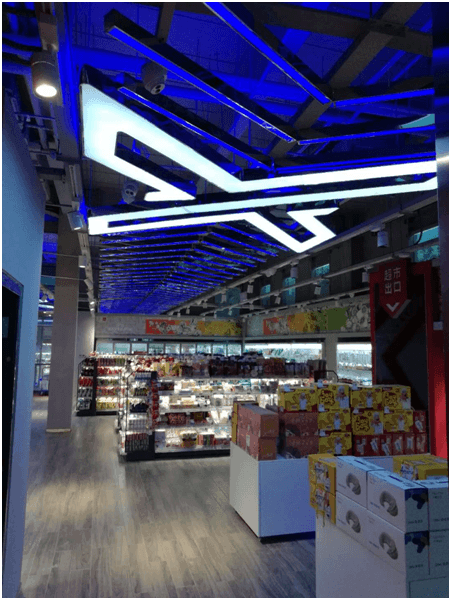
JD.com’s first unmanned store in Xiong’an is the largest for the e-commerce giant
China’s second-largest e-commerce company by sales, JD.com, has opened its first unmanned store in Xiong’an New Area, a new district being built just south of Beijing that the central government intends to develop into a new economic hub.
JD.com opened the 246 square metre (2,648 square foot). high tech retail venue on Tuesday, according to an article published on the company’s website, creating the e-commerce giant’s largest outlet in its growing chain of staffless stores.
The store, which allows smartphone-enabled shoppers to buy Pocky, Snickers and stinky tofu via facial recognition, also updates the retail experience by adding digital price tags that can provide updated price discounts and offers in real time. Customers simply walk through the “smart payment lanes” to check out without the need to reach for their wallets, JD said.
JD, which unveiled its first clerk-less store in the city of Yantai in Shandong province during January, has since opened over 10 staffless supermarkets in cities like Beijing, Tianjin, Dalian and Xian, and is also planning a second store in Xiong’an.
Jingdong Ramping Up Offline Portfolio

JD.com’s boss Liu Qiangdong announced last month that company would open 1,000 stores every day
The new store opening comes just two weeks after JD announced it would open 1,000 convenience stores every day by the end of 2018. The convenience retail plan runs on a franchise model, in which JD.com-branded outlets are opened and operated by independent business owners.
The e-commerce behemoth says it plans to open a total of one million convenience stores in the next four years, with half of these located in rural areas.
The company founded by celebrity CEO Liu Qiangdong is also working with big corporations to ramp up its offline retail portfolio. JD signed an agreement with Japanese convenience store operator FamilyMart in early March, enabling JD users to have food delivered to their homes from FamilyMart’s core locations in Beijing, Shanghai, Shenzhen and Chengdu within one half-hour at any time.
China Internet Giants Step Up Offline Competition
JD’s unmanned commerce effort comes as China’s second largest e-commerce platform ramps up competition with other internet giants to expand its tangible retail portfolio.
JD recently debuted its first offline fresh-food supermarket 7Fresh, a 4,000 square metre store in Beijing that features “smart carts” that guide customers to their desired aisles. The physical grocery venture rivals Alibaba’s Hema chain, which signed a deal with some of China’s biggest developers in March as it strives to open 2,000 online-to-offline (O2O) grocery stores across the nation in the next three to five years.
JD’s first high-profile deal in the emerging O2O retail sector was its investment of RMB 4.3 billion ($700 million) for a 10 percent stake in Shanghai-listed supermarket chain Yonghui Superstores in 2015.
In January, rival internet giant Tencent also invested in French retailer Carrefour’s China unit, which operates 225 hypermarkets and 30 convenience stores in China.
Leave a Reply